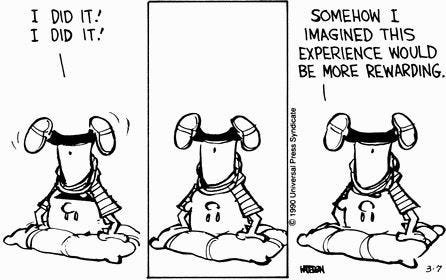Harnessing Intrinsic Motivation for Jiu Jitsu Happiness
bringing mojo back
Intrinsic motivation is the drive that comes purely from within, without any ostensible external rewards. You do it because it’s inherently enjoyable, and not because of any anticipated reward, deadline, or outside pressure.
Source: Psychology Today
A huge part of finding intrinsic motivation in jiu jitsu has been to find specific, internal goals to meet and to celebrate the effort behind taking any steps towards it.
For instance, in the way that my current school is set up, I have plenty of time in open practice to experiment and play with jiu jitsu. I come to class with a list of things that I want to drill or practice in specific training. More crucially, this is not a list of techniques that I find would be the most impressive to my coach, have the greatest amount of immediate success against my teammates or in competiton, or is what someone told me would help me reach the next rank. Instead, the list is based on an observation of what I found difficult in the last few practices, what I think would help me make jiu jitsu more enjoyable in future practices, and most importantly, what I find interesting to work through as a puzzle.
I didn’t always have this thought process when it came to jiu jitsu practices. In the past, I would walk away from a lot of practices feeling mentally defeated, or even worse, mentally defensive. I would get submitted a lot, sometimes in every round, sometimes by people my size or smaller, and have really no way of feeling great about how my training went.
I think the big shift came when I realized that jiu jitsu was going to be a lot more fun and sustainable if I got to work on things that I wanted to, and when I wanted to. By exercising my choices, I found myself a lot happier during and after training, because I was able to fulfill my own desires. Instead of thinking to myself “I am doing terribly today,” I’m able to focus more on thoughts like “today I discovered a new angle to pass deep lasso guard” or “I practiced a new re-centering technique for guard retention and now I am hitting it live.”
A big part of coming up with things that you have to work on means giving yourself the grace and compassion to make a lot of mistakes, too.
Again, this has never come to me naturally, but I have learned to do it with time. It comes down to letting myself feel the feelings, but also having a focus on what I will do differently next time. I find that most times when mistakes frustrate me in training, it’s because I have this unconscious assumption that I will be stuck there forever due to some flaw in myself. Having the awareness to tell yourself “That was pretty bad, but at least you tried and now you know better” means that you’re learning the skill to self-soothe yourself when things appear to be initially hopeless.
Another way to find your intrinsic motivation is to use metaphors to help you put words to your feelings in jiu jitsu. Just recently, I got an indoor garden kit for growing herbs. The instructions encourage you to trim back the herbs because that will actually help them grow better. A similar idea is when a forest fire can help the soil become more fertile than before. I always think about metaphors like these — where destruction leads to creation — because it helps me conceptualize my own jiu jitsu journey, where I’ve had to have many parts of me destroyed to really create a better self.
I particularly like using metaphors from nature because they feel more trustworthy than a life coach with an ulterior motive. But, depending on who you are, you may draw inspiration from religion, comics, video games, or some other niche interest that you understand deeply. The process of working through your feelings in this way means that you decide how to relate to your emotions — particularly those around success, failure, and learning which are so crucial to intrinsic motivation.
Lastly, practice enjoying other things besides jiu jitsu and notice why they are enjoyable. This advice might sound counterintuitive, but sometimes taking a step back and enjoying something besides jiu jitsu might make you appreciate the latter more. Sometimes, it takes teaching yourself the language of “fun” in other contexts before you try to apply it to a sport where people could break bones and choke people out.
I used to only focus on jiu jitsu as my sole activity, but it made me miserable. Instead of forcing myself to like jiu jitsu, I decided to take a little step back and try out other things that I was naturally inclined to do — things like writing, improv, coloring. The importance of doing these activities helped teach me what real joy and bliss felt like. I was then able to take this feeling back to jiu jitsu with me. Whenever I felt that familiar sensation, I would take note of what I was doing and how I was doing it:
Writing gave me a way to express myself, so I started to find more ways to express myself in jiu jitsu.
Improv was fun because I could bounce off people’s ideas and add to a scene, so I started to find more ways to ask people for their feedback and create a learning-friendly environment.
Coloring was fun because it was tangible and easy to see progress, so I started to really hone in on making incremental steps on a specific “page” of jiu jitsu, instead of scattering myself across too many areas.
The point is, the more connections you make with yourself, the better you can hone in on that intrinsic motivation. It’s a journey that’s worth taking.



